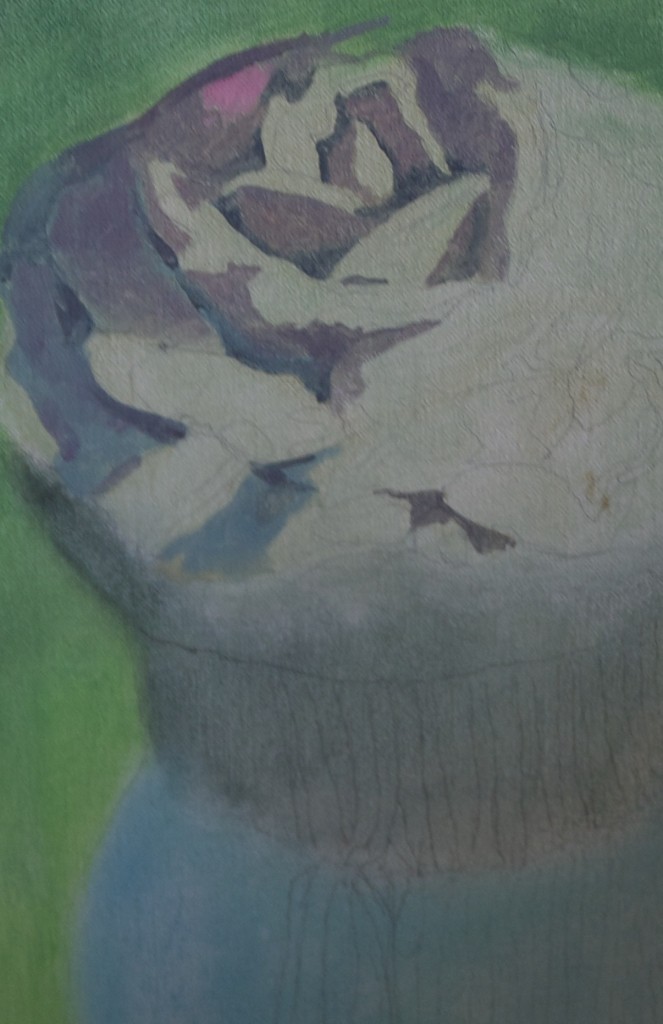Feel
So I got close to finishing a third cupcake yesterday and it brought back for me why both golf and painting can be extremely black emotional ordeals. I spoke in a previous post about the fear that precedes a golf shot or the first few brush strokes on a new canvas, which sounds laughable, but it isn’t fear of what’s going to happen at that particular moment. It’s anxiety over the irrational despair that can overwhelm you when you realize you’ve lost the feel of how to make a shot or paint a decent picture. (You never completely know how: that’s what you don’t want to face.) When it doesn’t go well, it strikes at the heart of your confidence in your ability to survive in the world, because it makes so clearly apparent that everything you thought you knew how to do, in order to get any sort of result, is just an image of an activity you carry around in your head. It isn’t the actual activity, which exists partly as instinct and muscle memory and subconscious intuition. You realize that this image in the head alone doesn’t enable you physically to get a reliable result. So when things go south, or threaten to, you’re faced with having utterly wasted four or five hours or days or weeks of your life—as a painter, of course. In the sporting version of this failure, the hours simply feel like years. When this happens, the frustration and suppressed anger quickly turn to a kind of peevish, childish despair—but it isn’t something you give in to. It comes over you like an opaque cloud. It leaves you feeling utterly helpless, until you go do something actually productive and forget yourself again. The self-loathing bubbles up. I just finished a nearly perfect painting. How can I be making such a mess of this one? I just birdied that par three. How can I step up the next tee and shank this drive? What is wrong with me? This can’t be my fault. I’m way better than this.
Painting, for me, is an essentially physical act, like golf. In both cases, this act is guided mostly by that region of my body that hovers between my crotch and my stomach, not my head. There’s plenty of knowledge that goes into what “works” and doesn’t “work” when I do a painting, but none of this knowledge avails if this indefinable “feel” isn’t there, this appetite to take each step in the process and watch it unfold as you’re doing it. This feel is instinctive and when it’s gone, mostly through inattention—or a loss of that appetite to move paint in a certain way—you feel as if you’re at sea and drowning. Rick Harrington almost needs to reach this kind of impasse with every painting and then push his way through it in order to get a painting to the point where it surprises and satisfies him. We talk about it all the time. And he’s been more courageous in staking his actual survival more on his income from painting, so reaching that kind of nadir in the process would be even more excruciating for him. The reality is that there are many paintings I’ve done that show me the path from the very first brush stroke, and I rarely hesitate or wonder what to do next because it’s usually pure realism and after all these years I know exactly how to achieve this effect or that, and what colors to mix and so on, with very few actual moments of indecision in the process of painting. The ordeal to overcome with those paintings is simply the long, slow time it requires to finish the work—its own sort of crucible. But when I’m shaping the image as much as dutifully rendering it, changing details and colors, simplifying and balancing one improvised color against another—as I’ve done in the past with abstracts and am trying to do with these cupcakes—it’s much more like trying to keep an ailing patient alive. The painting I worked on yesterday is breathing again, and I actually learned a couple new things by feeling as if I’d lost my way, but it still isn’t quite what I’m looking for. If these cupcakes succeed, they will surprise me with what it takes: there will be moments that offer up a solution or a step that I couldn’t have predicted.
But why this process, that moment when you think all is lost, can be so desperate and harrowing—it makes no sense to me. It’s only a single painting. It was only a day’s work. Or whatever finite amount of time. But life is short, and maybe that’s what’s lurking behind all this effort, a way of trying to do something perfectly even though time is running out. So my score with cupcakes so far is: one dud, one success, and one survivor. One thing’s for sure: today is not going to be like yesterday. I got ahead of myself, partly because I was watching the clock, and I quit feeling my way forward. Time: a too keen awareness of it. Maybe that’s a culprit both in why things go badly and why it feels so bad when they do. Today will be different.

Comments are currently closed.